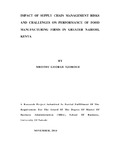| dc.description.abstract | The government of Kenya should realize that sustainable business development is
among the main goals of the millennium development goals. In this realization it
would be therefore critical for the government to be on the forefront in terms of policy
formulation towards development of food manufacturing firms and empowering small
scale farmers in their food production. This will help in making Kenya a food
sufficient country in line with vision 2030. Incentives on the food manufacturers
should be on the forefront since only incentives with economic benefit will entice the
business community to embrace food manufacturing for sustainable development in
the country. Relevant technology could also be subsidized where appropriate.
Enforcement of laws and implementation of structures for fare business practice
should be implemented. The government could also take up private public
partnerships with food manufacturers to ensure food security in the country is
enhanced. This study was carried out to ascertain the impact of supply chain
management risks and challenges facing food manufacturing firms in greater Nairobi
Kenya and their effects on performance. The objectives were: to establish the risks
and challenges facing food manufacturing supply chain management in greater
Nairobi Kenya and to determine the effects of supply chain risks and challenges on
performance of food manufacturing firms in greater Nairobi Kenya. The study
adopted descriptive survey research design where a census of all food manufacturing
firms was obtained. Data was successfully collected from supply chain managers or
their equivalents, analyzed using Statistical package for social sciences (SPSS) and
presented using percentages, mean, standard deviation in the form of tables and
graphs. Regression analysis was used to determine the effects of supply chain risks
and challenges on performance of food manufacturing firms in greater Nairobi Kenya.
The findings of the study indicate that the main supply chain management risks are
security risks; demand risks; supply risks and operational risks. The main supply
chain management challenges are also outlined. The regression analysis produced a
model that shows proper management of supply chain management risks and supply
chain management challenges would lead to increase in firm‟s performance. The
study encountered limitations such as inadequate time and delays by respondents
putting pressure on the time allocated for completing the project. | en_US |

